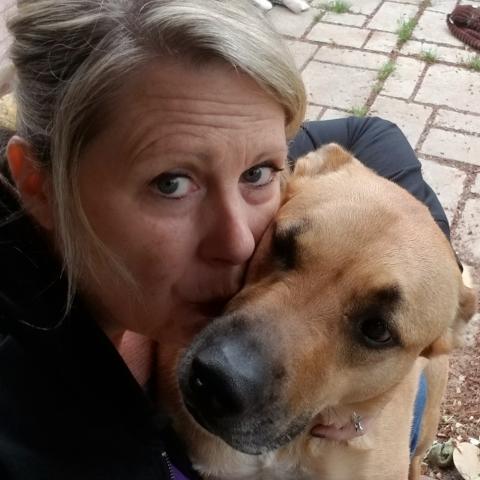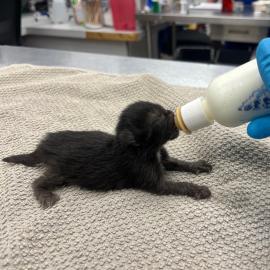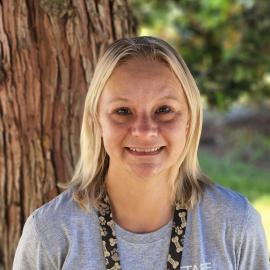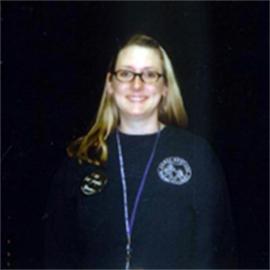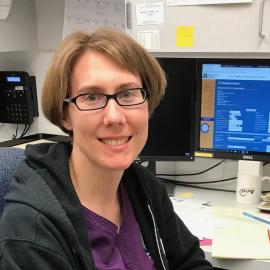Staff Spotlight- Tina H. Celebrates 5 Years
Meet Tina H., the Foster Coordinator at Multnomah County Animal Services (MCAS), celebrating five years as a staff member. Tina was previously a Client Services Lead before being promoted to her new position in April 2022.
From Healthcare to Petcare
Tina has a background working in healthcare, but when she decided to try something different, her sister-in-law insightfully suggested that she try working with animals, since caring for animals has always been one of her passions. “That planted a seed,” Tina says.
Tina “applied on a whim” for a Client Services job at MCAS in 2017. “I came in and I was hooked,” Tina says.
Animal Services are People Services
Tina remarks how services for animals ultimately serve their people. “I’ve grown a lot since I’ve worked at MCAS through experiences I’ve had working with community members. I’ve learned a lot about the needs of the houseless community, and how much their animals do for them to provide companionship, protection, and to support their mental and emotional health.”
Reunited
For Tina, seeing people reunited with their animals is one of the most rewarding things she sees on the job. “For a lot of people who have lost pets, they worry their animals are gone forever. When they find out that they’re here at the shelter, and will be coming home again, it can be the happiest moment of their lives, it’s so emotionally relieving for them.”
Fostering
When Tina first started working at MCAS, she was interested in fostering. “Shortly after I started, there was a really small puppy that came into the shelter near the end of the day,” Tina says. “Animal Care didn’t want them to stay in the kennels overnight, so they sent out a call for anyone who would be willing to take them home, and I offered.
“For my house, puppies fit. They are socialized with people and other animals, and my dogs do a good job of teaching them how to be a dog, including going potty outside. I’ve been a go-to for puppies ever since that first experience. It became a thing anytime a puppy came in, the Foster Coordinator knew that I would take them home.
“For puppies, my other dogs do most of the work. When you’re fostering young animals, it is helpful to have a social animal in the home to show them the ropes and also to expose them to as much as possible. Take puppies out into the world- expose them to kids, loud noises, cars, other dogs, cats, delivery workers, umbrellas, everything! Work on potty training, teach them default behaviors like sit, stay, leave it, just everything you can! You want to give them a basic foundation that their new families can work on and build from.
“One of my foster dogs, Hazel, was held in protective custody pending an investigation and legal proceedings. She came in as a very small puppy. She was originally sent to another foster home with her mom and siblings. When she was brought back, her foster mom just came in and put her in my arms, like, ‘happy birthday!’ Hazel and her sibling, Hammie, were with me for three months before it was time for them to go up for adoption. That was the first foster I really struggled with, and it gave me a pit in my stomach. I really didn’t want her to leave me, so Hazel became my first foster failure when I adopted her.”
Foster Coordinator
Having the perspective of a foster volunteer has helped Tina to settle into her new position as Foster Coordinator. Tina says “in this role- the foster parents do all the work, I just set them up on blind dates.”
“I knew that the Foster Coordinator position was the only role I was really interested in having apart from my former position. Jen, the Foster Coordinator before me, did a really good job, and made it look a lot easier than it really is to find new fosters and rescues. She was able to move animals out of the shelter that might not otherwise have had that opportunity. It really piqued my interest. As a foster volunteer, I was able to foster animals in hard situations, and legal cases, knowing that our kennels aren’t a great place to be for extended periods of time, and also seeing the difference that fostering can make in the health and wellbeing of the animals. It really made me want to do the job even more. Especially during kitten season, I don’t know what we would do without our amazing Foster Volunteers. I really like the established rapport between the Foster Volunteers and the shelter, it’s a great partnership.
“I also don’t think our foster program would be what it is without our Mentors. Our Foster Mentors are wonderful. They’re a group of volunteers who help train and answer questions for other Foster Volunteers. They’re so dedicated, it’s amazing. They sometimes respond to questions and give guidance in the middle of the night.
“I’ve already learned so much in the few months I’ve been in my role. We held our first bottle baby class for fosters, and I learned a ton from it. Our long-time Foster Volunteers, Robynne, Renee, and Ronda taught it. They were amazing. They really helped ease some of the new Foster Volunteers’ fears about bottle babies. For example, in young litters of kittens and puppies, failure-to-thrive is a common thing. They can die, and even when you’re doing everything right, things can go wrong, and it’s not your fault. I think it really helped relax new fosters to have that up-front conversation with these experienced volunteers about it.
“I’m looking forward to getting to know all of our volunteers, and also helping our Foster Volunteers get to know each other so that they have that foundation to be able to reach out and talk with each other. I’d like to explore activities like a day out for shelter animals, or short term foster arrangements to give animals some respite and have fewer animals in the shelter. Every animal has its unique needs, and putting an animal in foster- even for a short period of time- helps us better understand what their needs are, and how they will behave in the home as opposed to a shelter kennel.
“We’d like animals to go to their homes as soon as possible, but for many animals that isn’t feasible, and they need time. For example, kittens need to be in foster care until they’re big enough for spay or neuter surgery and adoption. Some animals in hospice may need care for several weeks, months, or longer.
“The bottom line is that fostering literally saves lives, and we’re really grateful to our amazing group of volunteers.”
Thank you, Tina, for your service to the pets and people of Multnomah County.
For interest in the MCAS Foster Program, learn more and submit an application at multcopets.org/foster, or email foster@multco.us.
